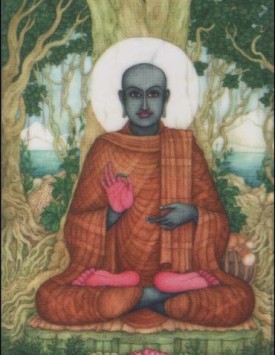Maudgalyāyana (Pali: Moggallāna), also known as Mahāmaudgalyāyana, was one of the Sakyamuni Buddha’s closest disciples. A contemporary of disciples such as Subhuti, Śāriputra, and Mahākasyapa, he is considered the second of the Buddha’s two foremost disciples, together with Śāriputra. Maudgalyāyana became a spiritual wanderer in his youth, together with his friend Śāriputra. After heaving searched for a while, they came into contact with the Buddhist teaching and eventually the Buddha himself. Maudgalyāyana attained enlightenment shortly after that. As a teacher, he became known for his psychic or supernatural powers, which he used extensively in his teaching methods. He died at the age of eighty-four, being killed through the efforts of a rivaling sect. This violent death was a result of Maudgalyāyana’s karma of having killed his own blind parents in a previous life.
In Mahāyāna texts, Maudgalyāyana became known for his filial piety through a popular account of him transferring his merits to his mother. The account led to a tradition in China and Japan known as the ghost festival, during which people dedicate their merits to their ancestors. He is thought to have also manifested as Kshitagarbha Bodhisattva.

